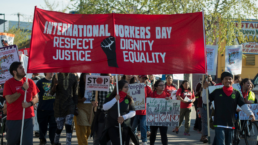In a tangled global economy, how can international labor solidarity go beyond symbolic support?
By Michelle Chen, Dissent
During last November’s Black Friday and Cyber Monday shopping bonanza, the hashtag #MakeAmazonPay started to percolate on Twitter. Activists circulated photographs of small rallies around the world, from a dockworkers’ banner drop in Sao Paolo to a demonstration in Berlin led by tech and warehouse workers opposing “Amazon’s dystopic surveillance practices.” A broad coalition of unions, environmental groups, and other allied organizations coordinated a day of action to condemn the e-tailer’s notorious pressure-cooker working conditions and demand an end to its systematic suppression of union organizing.

The scattered nature of these protests reflected how effective Amazon’s business model has been in atomizing its workforce. The German union ver.di reported a one-time work stoppage of about 2,500 workers across three cities. In Italy, the union SI Cobas posted a video of a one-day blockade of a fulfillment center in Piacenza, with “more than a thousand workers” condemning what the union called an expanding “precarious work model” that “creates a precedent for the whole of Italy, laying the foundations for the ruin of an entire generation of workers.” Yet elsewhere, Black Friday passed with no significant disruptions to Amazon’s business, which broke a record for sales that weekend. By the end of the year, the company had grown its workforce to 1.6 million people, about one-third outside the United States, an increase of 24 percent from the previous year.
The campaign was an expression of solidarity by a global community of sorts, but there were too few workers, too far from each other, to actually jam up Amazon’s gargantuan supply chain. In an increasingly integrated global economy, a huge employer like Amazon can forge a collective identity for workers across the world, but that collective experience does not easily translate into global organizing under the banner of international solidarity. For the last few decades, even as other social justice movements have become more oriented toward transnationalism and global politics, international labor solidarity has often been practiced only symbolically, reflecting the paradox of a global economy in which products and services flow seamlessly over borders that divide and ensnare workers.
Recent Posts
Mayor Mamdani’s First Day, A Zero Hour Conversation With Richard Wolff
July 2, 2025
Take Action Now If elected, what would Mayor Mamdani do on his first day in City Hall? How would a democratic socialist govern as a big-city mayor?……
The U.S. Is Funding A Bloodbath At Gaza Aid Centers
July 2, 2025
Take Action Now The admin just gave $30M to GHF, the organization at the center of charges that Israel is weaponizing assistance and shooting at…
Feeding The Warfare State
July 1, 2025
Take Action Now We Lose, the Weapons Makers WinBy William D. Hartung, Tom Dispatch The Senate is on the verge of passing the distinctly misnamed…
The Rage Of Billionaires And The Frenzy To Stop Zohran Mamdani From Becoming New York’s Mayor
June 30, 2025
Take Action Now The constellation of forces now regrouping with a vengeance includes titans of Wall Street, enormous real estate interests,…




